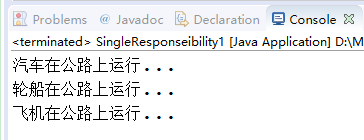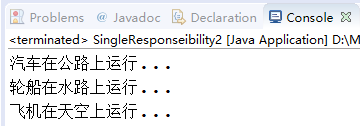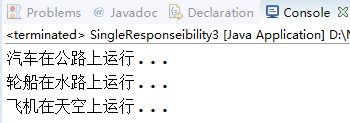单一职责原则
即一个类应该只负责一项职责
单 一职责原 则 注意事项和细节
1) 降低类的复杂度,一个类只负责一项职责。
2) 提高类的可读性,可维护性
3) 降低变更引起的风险
4) 通常情况下, 我们应当遵守单一职责原则,只有逻辑足够简单,才可以在代码级违
反单一职责原则;只有类中方法数量足够少,可以在方法级别保持单一职责原则
出现违背单一原则的情况 run方法违背了单一职责原则 不同交通工具应该有不同的运行

package com.wf.zhang.singleresponsibility; /** * 设计模式七大原则 单一职责原则 类级别 一个类负责一个职责 * * @author wf.zhang * * 出现问题===>类出现违背单一职责原则 */ public class SingleResponseibility1 { public static void main(String[] args) { Vehicle v = new Vehicle(); v.run("汽车"); v.run("轮船"); v.run("飞机"); } } /** * 交通工具类 * * @author wf.zhang * */ class Vehicle { public void run(String vehicle) { System.out.println(vehicle + "在公路上运行..."); } }

解决一 定义多个类 成本高
package com.wf.zhang.singleresponsibility; /** * 解决 1 定义单独的类 (类分解) 使用不同类的的方法 实现不同需求 * * @author wf.zhang * */ public class SingleResponseibility2 { public static void main(String[] args) { RoadVehicle roadVehicle = new RoadVehicle(); roadVehicle.run("汽车"); WaterVehicle waterVehicle = new WaterVehicle(); waterVehicle.run("轮船"); SkyVehicle skyVehicle = new SkyVehicle(); skyVehicle.run("飞机"); } } /** * 交通工具类 * * @author wf.zhang * */ class RoadVehicle { public void run(String vehicle) { System.out.println(vehicle + "在公路上运行..."); } } class WaterVehicle { public void run(String vehicle) { System.out.println(vehicle + "在水路上运行..."); } } class SkyVehicle { public void run(String vehicle) { System.out.println(vehicle + "在天空上运行..."); } }

解决二 (推荐)
package com.wf.zhang.singleresponsibility; /** * 解决 2 类 (方法分解) 定义不同方法 * * 类遵守单一原则 方法没有遵守单一原则 * @author wf.zhang */ public class SingleResponseibility3 { public static void main(String[] args) { CommonVehicle commonVehicle = new CommonVehicle(); commonVehicle.run("汽车"); commonVehicle.runWater("轮船"); commonVehicle.runSky("飞机"); } } /** * 交通工具类 * * @author wf.zhang * */ class CommonVehicle { public void run(String vehicle) { System.out.println(vehicle + "在公路上运行..."); } public void runWater(String vehicle) { System.out.println(vehicle + "在水路上运行..."); } public void runSky(String vehicle) { System.out.println(vehicle + "在天空上运行..."); } }

